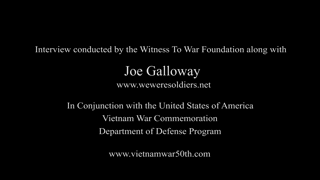5:03 | Jimmie Spencer was assigned to the 1st Cavalry Air Mobile when he arrived for his first tour in Vietnam. He was designated as a forward observer, which means he always had a radio. With that and his Ranger tab and his NCO rank, he went on practically every patrol the unit did.
Keywords : Jimmie Spencer Vietnam An Khe Baghdad C-130 air mobile Mortarman Forward Observer (FO) non-commisioned officer (NCO) patrol radio Ranger ambush Ia Drang door gunner helicopter Joe Galloway

After the battle of the Ia Drang Valley, the word went out. Infantrymen were needed and Jimmie Spencer answered the call. Pulled from the 101st Airborne, he arrived in Vietnam and was overwhelmed by the exotic culture and underwhelmed by the poorly organized replacement depot where he waited for assignment.
The cargo parachute worked well as a tent until the monsoons started. That's when Jimmie Spencer and his buddies had to move into a real tent. Life at the base camp meant daily pills for malaria, rusty beer cans, and at first, no showers.
Despite minimal contact with civilians during his first tour of Vietnam, Jimmie Spencer developed a great curiosity about their culture. On his second tour, he was an advisor to the Regional and Popular Forces, local civilian militias, which was perfect for him. He was dismayed, however, at the callous attitude toward them held by most Americans. He was also grateful that the racial divisions in society back home did not penetrate to the unit level in the field.
A main activity during down time at the An Khe base camp was movie time. Gunsmoke episodes were big, with an occasional sniper bullet aimed at the screen. As soon as the men heard These Boots Are Made For Walking, it became the theme song for the 1st Cavalry.
He was never in a big battle, but there were plenty of firefights on the long patrols. Jimmie Spencer describes his first combat encounter, in which they lost men to accidents before they even encountered the enemy. This led to changes in a number of procedures as they became more experienced.
For Jimmie Spencer, the best day of his Vietnam experience was the day he was promoted to staff sergeant, a validation of his effort. The worst day was the ambush when he listened to the screams of a wounded enemy soldier for hours as he waited for dawn.
When he returned from Vietnam, Jimmie Spencer did not experience the abuse that many returning veterans faced, but between his two tours, he was turned away from a bar in South Carolina, of all places. Later in his career, he was looking forward to an organization day for families on base at Fort Bragg when Hollywood protestors caused the event to be cancelled.
There was a period of readjustment for Jimmie Spencer when he returned from Vietnam. Raised to believe in the sanctity of human life, he was then required to take it in combat. This led to thoughts of mayhem when he faced problems back at home. The alcohol that was so often a part of Army life did not help.
Vietnam veterans are always in the crowd welcoming home those returning from Afghanistan and Iraq, says Jimmie Spencer. They want to ensure that no one else faces what they did. When he returned home, he was not welcome at the VFW. He is proud of his Vietnam service and says it was the honorable thing to do.
Jimmie Spencer mentally kept two lists while in Vietnam, things done right and things done wrong. He then spent the next thirty years as a lifer trying to set things right. At the top of his list was the practice of sending in individual replacements. The Army wisely returned to training and deploying men as a unit. He also describes trying to advise people who had already been fighting for decades.
What is the main lesson to be learned from the Vietnam experience? For Jimmie Spencer, it is simple. Do not deploy American soldiers without giving them the full resources and backing they need to do the job. He also worries that today's budget constraints will lead to an unprepared force.
Jimmie Spencer was dead set against the proposed design of the Vietnam Veterans Memorial, thinking it was like a tombstone. But he has come around and now sees it as a great thing, bringing closure to those still disturbed by the experience.